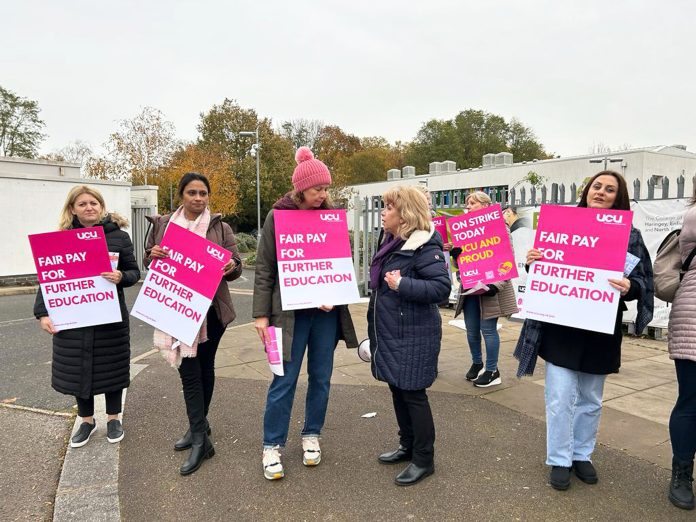NEC elections – left wins majority
Duncan Moore, Newly elected to UCU NEC
Last year, post-16 education workers, across universities, colleges and prison education, took historic strike action to defend pay and conditions.
University and College Union (UCU) members came out onto the picket lines determined to fight back, and in many cases won significantly more than the employers had offered. But we could have won more. Pay is still falling in real terms, workloads continue to increase, and a crisis in funding is unfolding in all sectors the UCU represents.
Members have proven their determination to fight. We need a leadership which is accountable to members, armed with a serious, fighting strategy that is properly prepared for and built.
Members have elected left candidates from various groupings to lead their National Executive Committee (NEC) and the Higher and Further Education Committees (HEC and FEC).
In the elections I campaigned on a programme which reflected the needs and concerns of UCU members: building a serious campaign of action for above-inflation pay rises; an end to marketisation, casual contracts and job insecurity; winning binding national agreements on pay and workload in Further Education; and full funding of post-16 education.
To achieve these demands, our union needs a serious political strategy, alongside a fighting industrial one. In the general secretary election campaign, Jo Grady has made clear she is preparing the way for a “partnership” with an incoming Labour government under Keir Starmer, with her manifesto boasting of “incredibly strong political relationships”.
But Starmer has shown that he is not on the side of workers, and will only bring more cuts in funding and hardship for post-16 educators. Local council-funded adult education providers, such as my workplace, face redundancies and potential closure, as a result of cuts under Tory- and Labour-led councils.
The UCU currently uses its political fund for lobbying politicians of all the capitalist parties; but nothing in our rulebook prevents members from standing as candidates in elections – we need candidates who will support our members and policies. I will stand in my local council ward under the Trade Unionist and Socialist Coalition (TUSC) banner in May, and encourage others to do so.
General secretary election – Jo Grady just clings on
Bea Gardner, UCU member
Incumbent general secretary of the University and Colleges Union (UCU), Jo Grady, has been narrowly re-elected, with half the first-preference votes that she won in 2019.
This result was not the decisive backing for her leadership that she hoped it would be. There were less than 200 votes between her and second-place candidate Ewan McGaughey, and 65% of the first-preference votes went to the three opposition candidates.
In 2019, Grady was seen as the spearhead of the ‘no capitulation’ pushback against attempts by then general secretary Sally Hunt to prematurely end the 2018 pension strike. In last year’s NEC election, coming just after national strike action, Grady’s faction made gains.
But this year’s results clearly indicate a declined confidence in Grady’s leadership. Among the union activists there is widespread frustration with the Higher Education strike ‘pause’ and other retreats.
It is indicative of Grady’s direction of travel that last year she accepted a 16.3% pay rise, taking her salary to over £125,000, despite having pledged not to accept any offer above that of FE members.
The general secretary results also confirm the Socialist Party’s analysis that had the left groupings come together to agree a single candidate on a left programme, they could have stood a serious chance of winning. The combined vote for the two left candidates, Saira Weiner and Vicky Blake, was higher than Grady’s vote.
As a paid official, Grady is constrained by the decisions of the now left-leaning NEC and two sectoral sub committees (the HEC and FEC), which have the mandate to set industrial action and can, if properly organised, use their mandate to direct the activities of the general secretary.
This is why Grady has consistently undermined these committees and her manifesto pledges more of the same, including plans to “modernise” the democratic structures of the union. Grady is already actively organising against the outgoing left-led FEC to override the decision to move to an aggregated ballot in that sector.
This makes more urgent the need for those who want a democratic fighting union to organise democratically at every level of the union. Bringing together the various left groupings could be a part of that process, as well as reaching out to draw together all those members who want to campaign.
Grady has already been pushed further than she wanted due to pressure from the members. UCU should be a member-led union and, if organised, it will be members, including their accountable representatives on the NEC, that determine the extent of action taken in the coming period.








